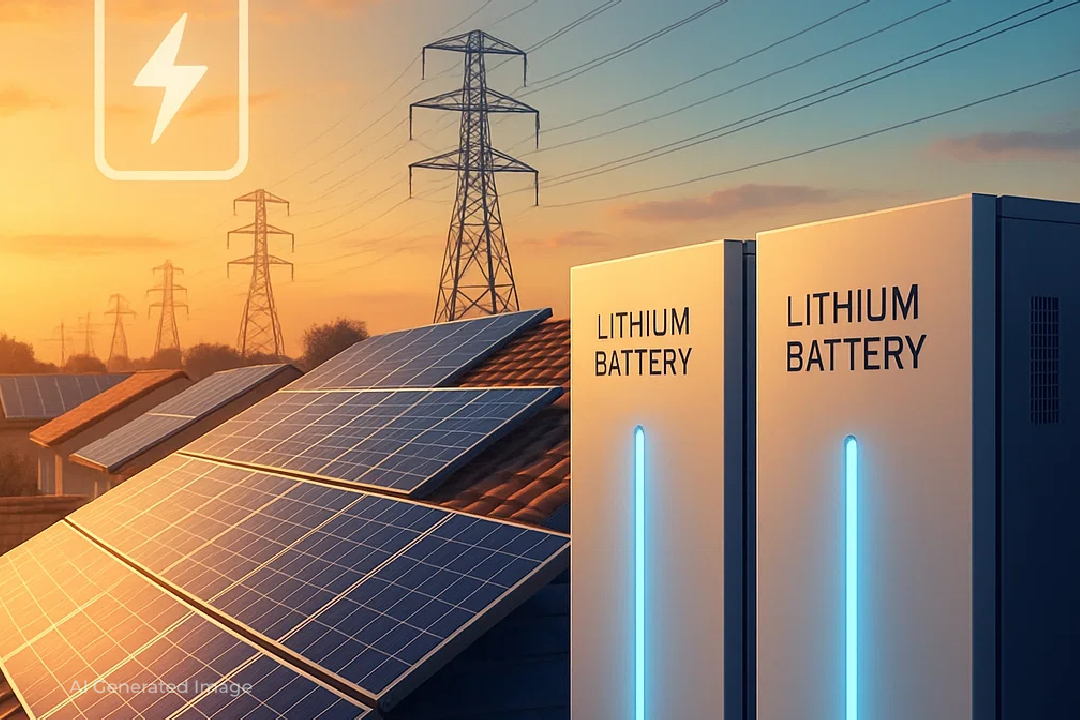Wary of possible changes to net-metering policy, consumers are bidding farewell to national girl
Pakistan’s energy sector was coping with the effects of the countless solar systems installed in the last two years, when it faced another challenge of lithium batteries. A 5.6kW lithium battery and 6kW solar panel system can not only supply electricity to a house or office, but it can also provide seven to eight hours of backup without heavy load. Adding a heavy load (1.5 tonne AC) reduces the backup time to three to four hours.
The solar panels and net-metering system keep the consumer on the grid which means that despite reducing their electricity bill, the consumer remains connected to the national electricity generation and transmission system. But the combination of solar panels and lithium batteries makes the consumers completely independent of the system or their dependence on the system remains partial (hybrid system).
Solar engineer Ikhlaq Ahmed is using the battery as a backup and looks very satisfied.
“I installed a lithium battery two months ago, a hybrid inverter was already installed, through which I not only store electricity but also send it to the grid. I have switched to solar completely. The Wapda bill is negligible, in fact this month it has been -23,000 rupees.”
Abdul Razzaq runs a solar systems and batteries business in Lahore. He says that earlier lithium batteries were used only in mobile phones and were very expensive, but now they are very common.
“Earlier, I used to sell only solar panels, but now more than 50 batteries are also sold daily. I will soon achieve the target of 100 units per month,” he informs Lok Sujag.
According to the State Bank of Pakistan, the total value of imports of electrical storage batteries from China in 2023 was $51.6 million, which increased to $65 million in 2024. In the first five months of 2025 alone, these imports have exceeded $62 million.
Mujahid Hussain has been importing batteries from China for six years. He says that earlier, he used to place the order for one container of batteries, but now he orders four to five containers.
There is evidence that just as the consumers installed solar panels in droves in the last two years, they are now adding seven lithium batteries to their panels at the same rapid pace.
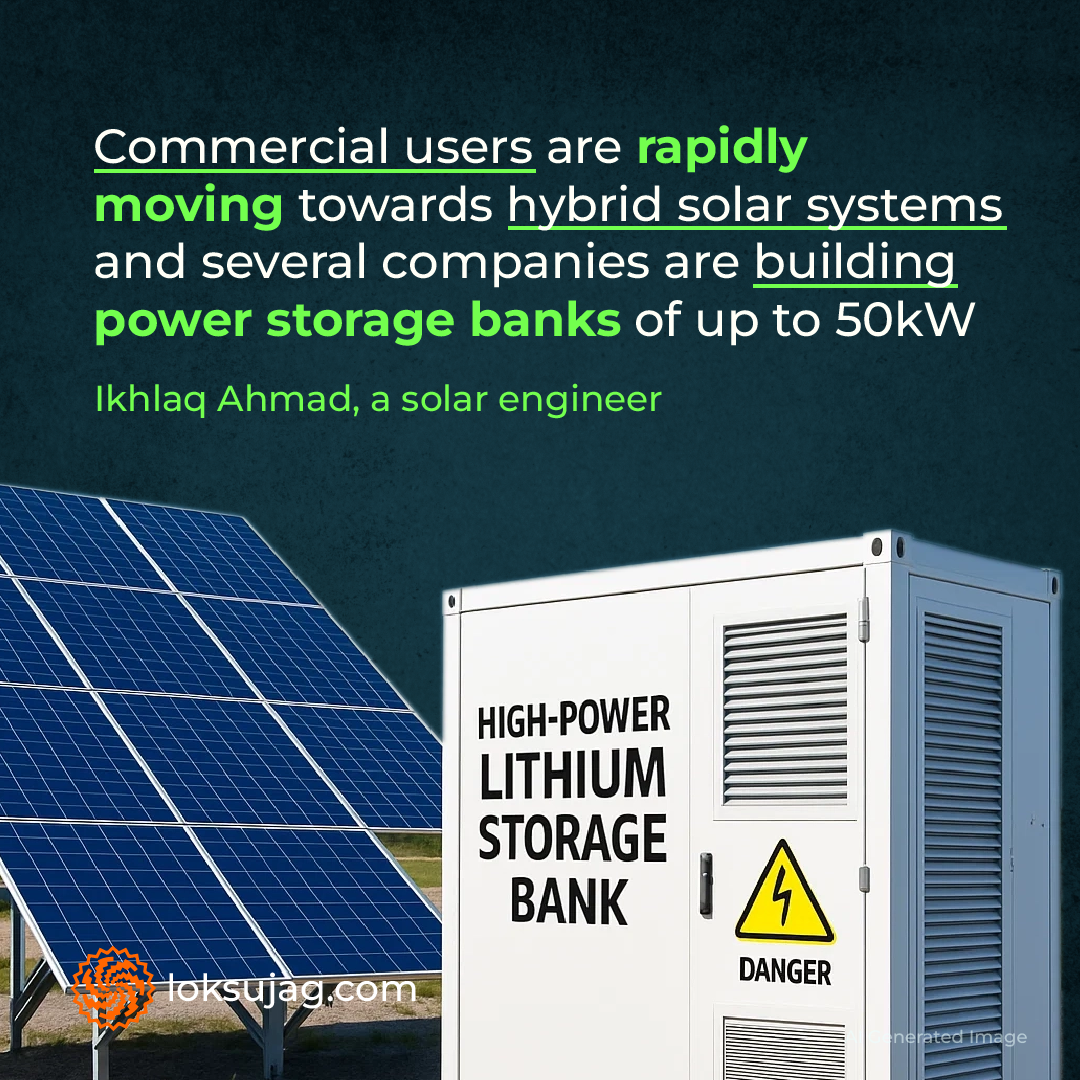
Uncertain net-metering policy pushing consumers towards solar
An official of an electricity distribution company, on condition of anonymity, says that there could be several reasons for the increase in use of solar system and batteries among small businesses, but the most important one is that the consumers are afraid that the government will change its net-metering policy.
Syed Qamar Mehdi has been installing solar systems for several years. He says that lithium-ion batteries have become an old technology in China. People there are now switching to lithium iron phosphate and sodium-ion batteries and the old batteries have become cheaper, which are being imported into Pakistan in large numbers.
The second important factor is the government’s proposal to reduce the net-metering rate in March this year from Rs22 and Rs27 per unit to just Rs10, while consumers were getting electricity back for Rs35 to Rs40 per unit.
Ikhlaq Ahmed thinks that the abovementioned move has shaken the confidence of the consumers due to which people have decided to become self-sufficient.
Abdul Razaq says that earlier people used to use on-grid inverters but now they are preferring lithium batteries to store the electricity they generate. However, according to a DISCO official, the change in the rate is a part of the efforts to make the energy policy sustainable so that the financial balance of the entire system can be maintained.
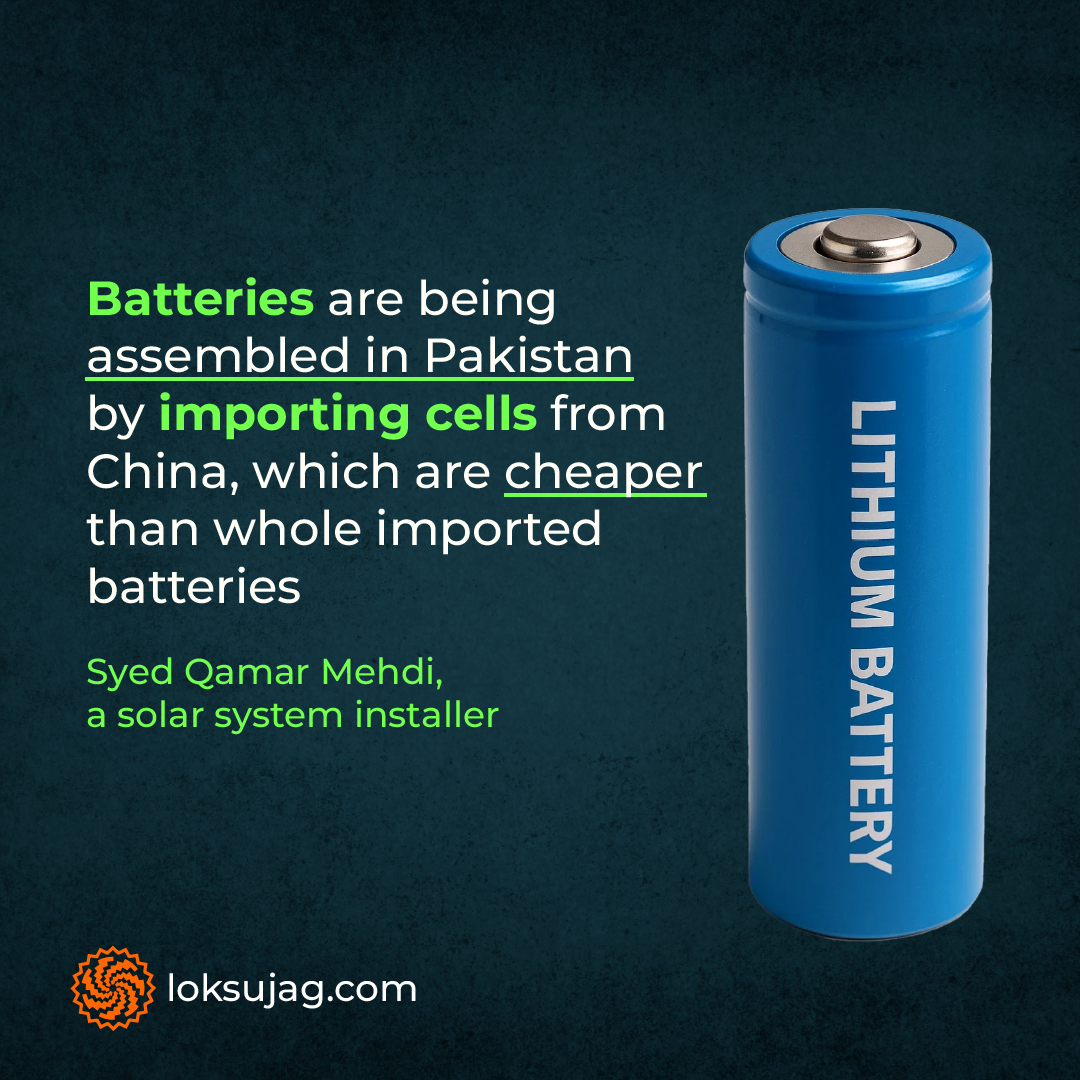
Local assemblage of Chinese parts made batteries cheaper
Jahanzeb Khan, who imports inverters and batteries, says that the power of one lithium battery is equal to four tubular batteries and it lasts for at least 15 years.Earlier, 60 percent of the systems were on-grid and 40 percent hybrid, but now the situation has reversed, meaning 80 percent of the systems are hybrid and only 20 percent are on-grid.
An on-grid inverter does not store electricity but sends excess electricity back to the grid, but a hybrid inverter supplies electricity to the grid and also stores energy in batteries that can be used at night. A typical 5kW lithium battery costs Rs2500,000 to 300,000, while commercial solar systems are going up to 15kW.
Abdul Razaq said that last month, he installed a 14kW system in a hospital that runs entirely on lithium batteries at night. According to solar engineer Ikhlaq Ahmed, large commercial institutions are developing 50kW high-power storage banks. Although most of their customers are households and small businesses, the EV (electric vehicle: electric vehicles and motorcycles) sector is also showing increasing interest in it.
Atiya Nayab, who runs an EV company, says that earlier vehicle batteries used to deteriorate quickly but lithium batteries have eliminated this problem. Its price has also come down by 50pc, a further reduction due to local assemblage.
Syed Qamar Mehdi says that batteries are being assembled in Pakistan after importing only cells from China, which are cheaper than whole imported batteries. However, the average solar setup (including batteries) costs about Rs700,000, which only the wealthy can afford. Poor consumers are still at the mercy of the grid and have to pay for their electricity.
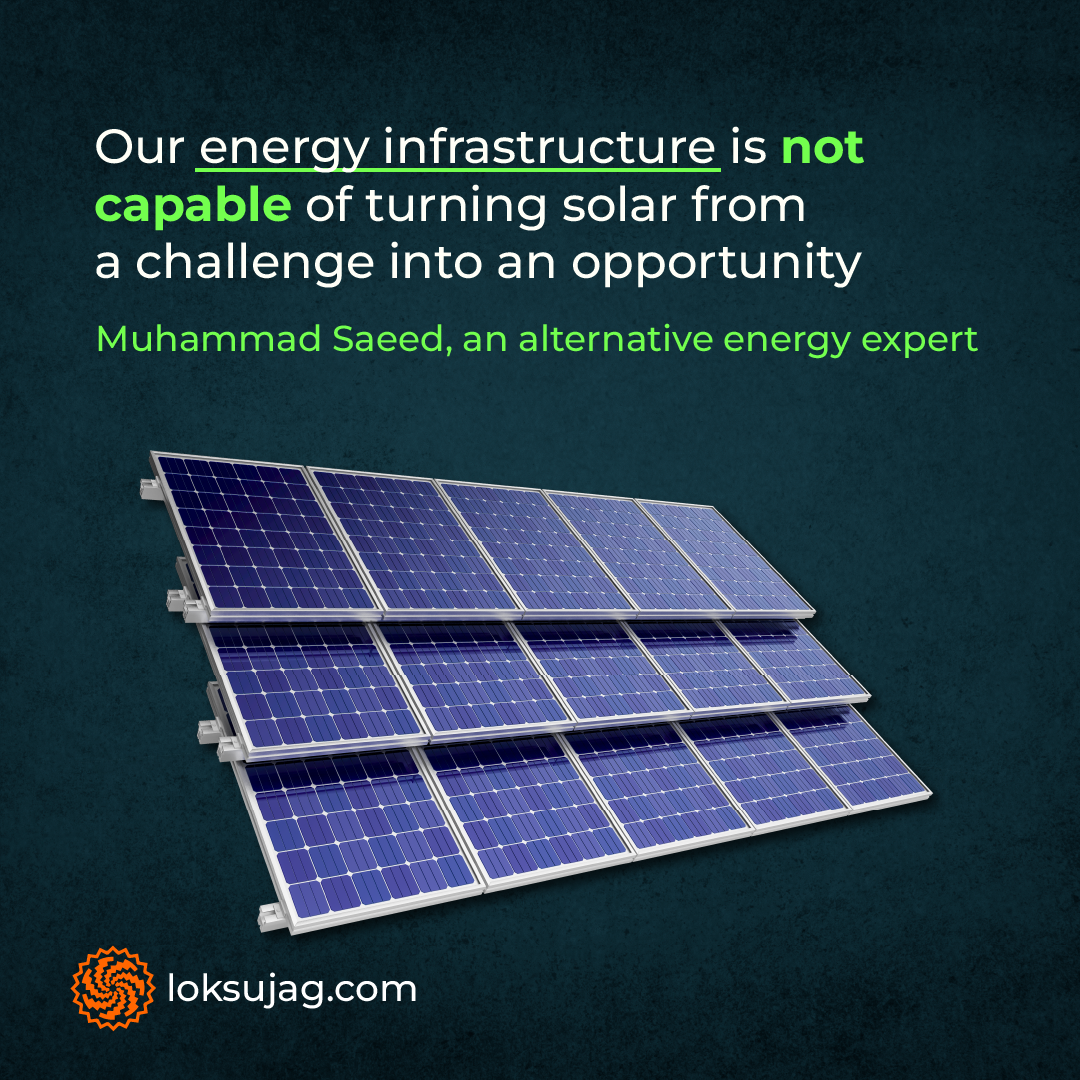
Threat to national grid can turn into an opportunity
A DISCO official believes that as small businesses and domestic consumers disconnect from the grid, the demand for electricity in the system decreases, especially during the day when solar power generation is at its peak. This situation not only leads to underutilization of the existing power generation capacity but also affects the income of the DISCOs. After all, they (DISCOs) also have to maintain the grid and meet their expenses from the revenue generated by these consumers. According to the official, this trend has also been seen in some states of Australia and the US, where electricity distribution companies have been forced to adopt new business models.
Alternative energy expert Mohammad Saeed says that Germany also initially considered this situation as a threat but then turned it into an ‘opportunity’.
In Germany, the buying and selling of energy is like a stock market, meaning anyone can buy or sell electricity and strike a contract at any time. This transparency benefits all parties, namely consumers, producers and the government.
“But our energy infrastructure does not have the capacity to handle such innovation or change.”
Saeed suggests that 40pc of the feeders have to be solarised, and the rest need to be stabilised, which will need to be protected from damage by introducing smart inverters and forecasting stations.
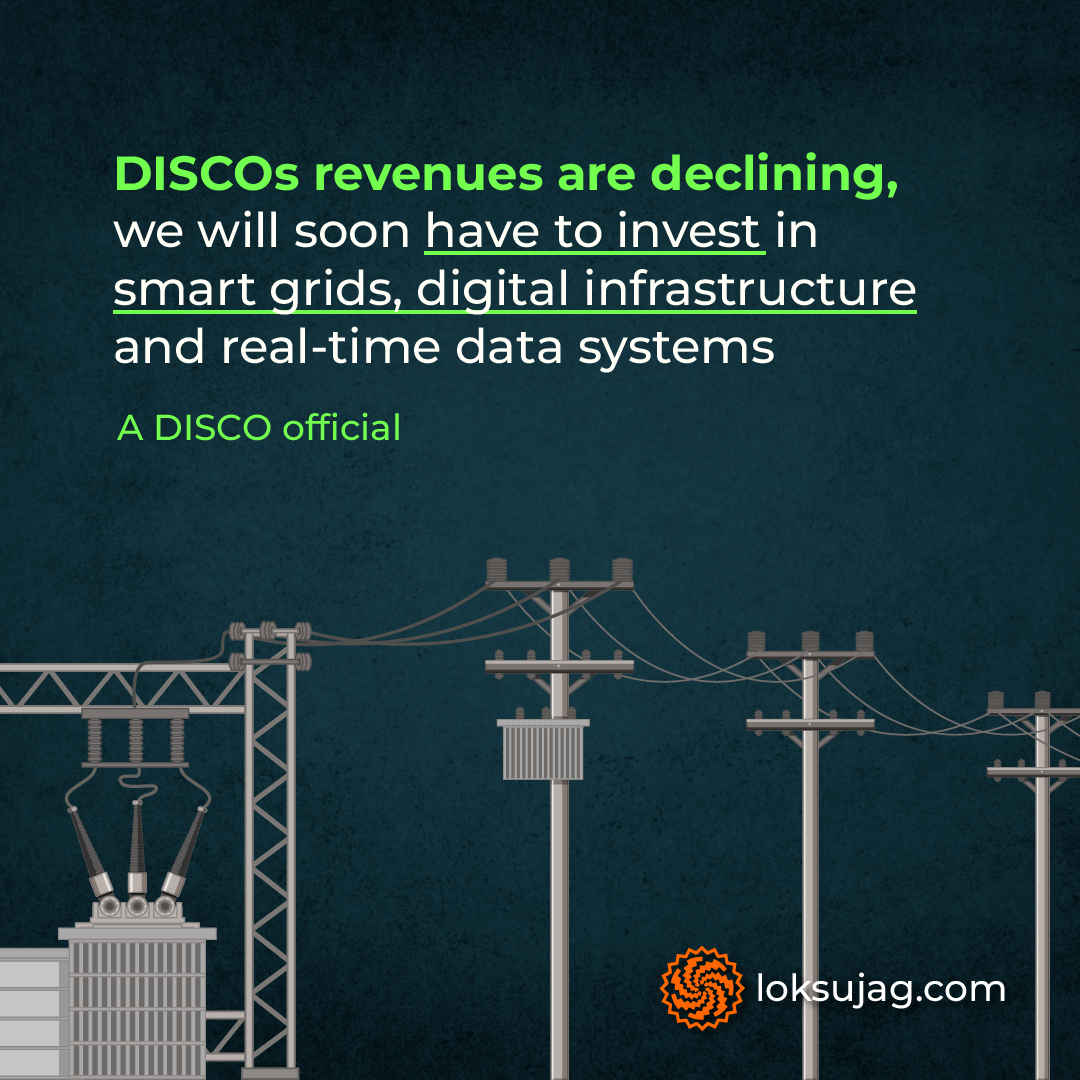
The DISCO official also seems to agree with Mohammad Saeed.
“Our electricity system is under government control and the pace of change is very slow. For change, we will have to invest in smart grids, digital infrastructure and real-time data systems soon. At the same time, tariff reforms are necessary so that the system is financially stable and the poor are not affected.”
He says that a positive development is that K-Electric's subsidiary, K-Solar, has signed an agreement with Huawei to install battery storage, EV charging infrastructure and microgrids across the country.
Published on 11 Jul 2025
